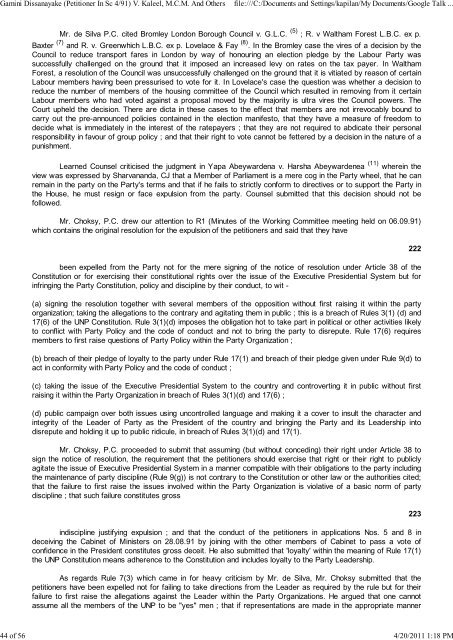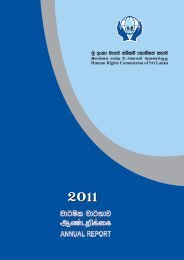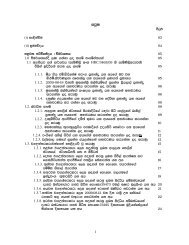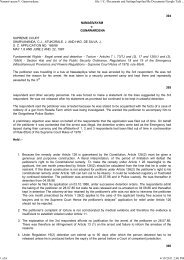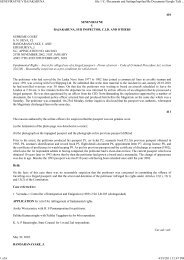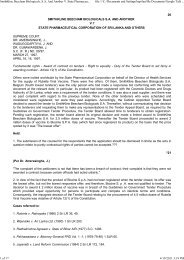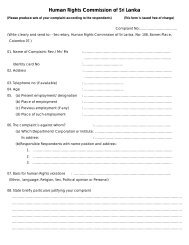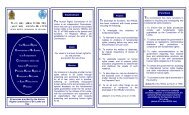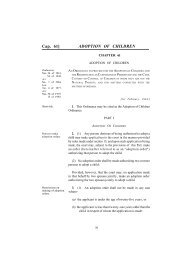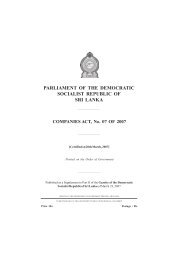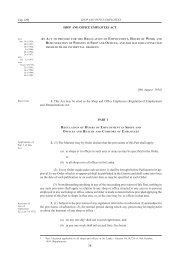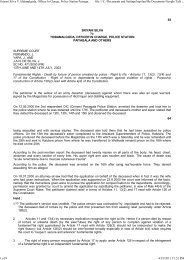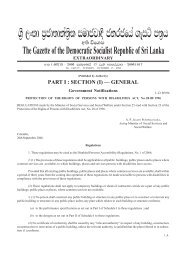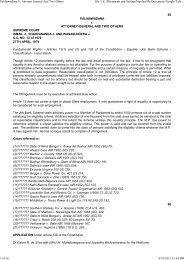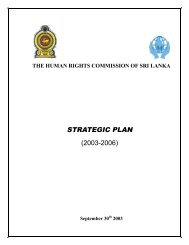Gamini Dissanayake (Petitio... - Human Rights Commission of Sri ...
Gamini Dissanayake (Petitio... - Human Rights Commission of Sri ...
Gamini Dissanayake (Petitio... - Human Rights Commission of Sri ...
Create successful ePaper yourself
Turn your PDF publications into a flip-book with our unique Google optimized e-Paper software.
<strong>Gamini</strong> <strong>Dissanayake</strong> (<strong>Petitio</strong>ner In Sc 4/91) V. Kaleel, M.C.M. And Others file:///C:/Documents and Settings/kapilan/My Documents/Google Talk ...<br />
Mr. de Silva P.C. cited Bromley London Borough Council v. G.L.C. (5) ; R. v Waltham Forest L.B.C. ex p.<br />
Baxter (7) and R. v. Greenwhich L.B.C. ex p. Lovelace & Fay (8) . In the Bromley case the vires <strong>of</strong> a decision by the<br />
Council to reduce transport fares in London by way <strong>of</strong> honouring an election pledge by the Labour Party was<br />
successfully challenged on the ground that it imposed an increased levy on rates on the tax payer. In Waltham<br />
Forest, a resolution <strong>of</strong> the Council was unsuccessfully challenged on the ground that it is vitiated by reason <strong>of</strong> certain<br />
Labour members having been pressurised to vote for it. In Lovelace's case the question was whether a decision to<br />
reduce the number <strong>of</strong> members <strong>of</strong> the housing committee <strong>of</strong> the Council which resulted in removing from it certain<br />
Labour members who had voted against a proposal moved by the majority is ultra vires the Council powers. The<br />
Court upheld the decision. There are dicta in these cases to the effect that members are not irrevocably bound to<br />
carry out the pre-announced policies contained in the election manifesto, that they have a measure <strong>of</strong> freedom to<br />
decide what is immediately in the interest <strong>of</strong> the ratepayers ; that they are not required to abdicate their personal<br />
responsibility in favour <strong>of</strong> group policy ; and that their right to vote cannot be fettered by a decision in the nature <strong>of</strong> a<br />
punishment.<br />
Learned Counsel criticised the judgment in Yapa Abeywardena v. Harsha Abeywardenea (11) wherein the<br />
view was expressed by Sharvananda, CJ that a Member <strong>of</strong> Parliament is a mere cog in the Party wheel, that he can<br />
remain in the party on the Party's terms and that if he fails to strictly conform to directives or to support the Party in<br />
the House, he must resign or face expulsion from the party. Counsel submitted that this decision should not be<br />
followed.<br />
Mr. Choksy, P.C. drew our attention to R1 (Minutes <strong>of</strong> the Working Committee meeting held on 06.09.91)<br />
which contains the original resolution for the expulsion <strong>of</strong> the petitioners and said that they have<br />
been expelled from the Party not for the mere signing <strong>of</strong> the notice <strong>of</strong> resolution under Article 38 <strong>of</strong> the<br />
Constitution or for exercising their constitutional rights over the issue <strong>of</strong> the Executive Presidential System but for<br />
infringing the Party Constitution, policy and discipline by their conduct, to wit -<br />
(a) signing the resolution together with several members <strong>of</strong> the opposition without first raising it within the party<br />
organization; taking the allegations to the contrary and agitating them in public ; this is a breach <strong>of</strong> Rules 3(1) (d) and<br />
17(6) <strong>of</strong> the UNP Constitution. Rule 3(1)(d) imposes the obligation hot to take part in political or other activities likely<br />
to conflict with Party Policy and the code <strong>of</strong> conduct and not to bring the party to disrepute. Rule 17(6) requires<br />
members to first raise questions <strong>of</strong> Party Policy within the Party Organization ;<br />
(b) breach <strong>of</strong> their pledge <strong>of</strong> loyalty to the party under Rule 17(1) and breach <strong>of</strong> their pledge given under Rule 9(d) to<br />
act in conformity with Party Policy and the code <strong>of</strong> conduct ;<br />
(c) taking the issue <strong>of</strong> the Executive Presidential System to the country and controverting it in public without first<br />
raising it within the Party Organization in breach <strong>of</strong> Rules 3(1)(d) and 17(6) ;<br />
(d) public campaign over both issues using uncontrolled language and making it a cover to insult the character and<br />
integrity <strong>of</strong> the Leader <strong>of</strong> Party as the President <strong>of</strong> the country and bringing the Party and its Leadership into<br />
disrepute and holding it up to public ridicule, in breach <strong>of</strong> Rules 3(1)(d) and 17(1).<br />
Mr. Choksy, P.C. proceeded to submit that assuming (but without conceding) their right under Article 38 to<br />
sign the notice <strong>of</strong> resolution, the requirement that the petitioners should exercise that right or their right to publicly<br />
agitate the issue <strong>of</strong> Executive Presidential System in a manner compatible with their obligations to the party including<br />
the maintenance <strong>of</strong> party discipline (Rule 9(g)) is not contrary to the Constitution or other law or the authorities cited;<br />
that the failure to first raise the issues involved within the Party Organization is violative <strong>of</strong> a basic norm <strong>of</strong> party<br />
discipline ; that such failure constitutes gross<br />
indiscipline justifying expulsion ; and that the conduct <strong>of</strong> the petitioners in applications Nos. 5 and 8 in<br />
deceiving the Cabinet <strong>of</strong> Ministers on 28.08.91 by joining with the other members <strong>of</strong> Cabinet to pass a vote <strong>of</strong><br />
confidence in the President constitutes gross deceit. He also submitted that 'loyalty' within the meaning <strong>of</strong> Rule 17(1)<br />
the UNP Constitution means adherence to the Constitution and includes loyalty to the Party Leadership.<br />
As regards Rule 7(3) which came in for heavy criticism by Mr. de Silva, Mr. Choksy submitted that the<br />
petitioners have been expelled not for failing to take directions from the Leader as required by the rule but for their<br />
failure to first raise the allegations against the Leader within the Party Organizations. He argued that one cannot<br />
assume all the members <strong>of</strong> the UNP to be "yes" men ; that if representations are made in the appropriate manner<br />
44 <strong>of</strong> 56 4/20/2011 1:18 PM<br />
222<br />
223


